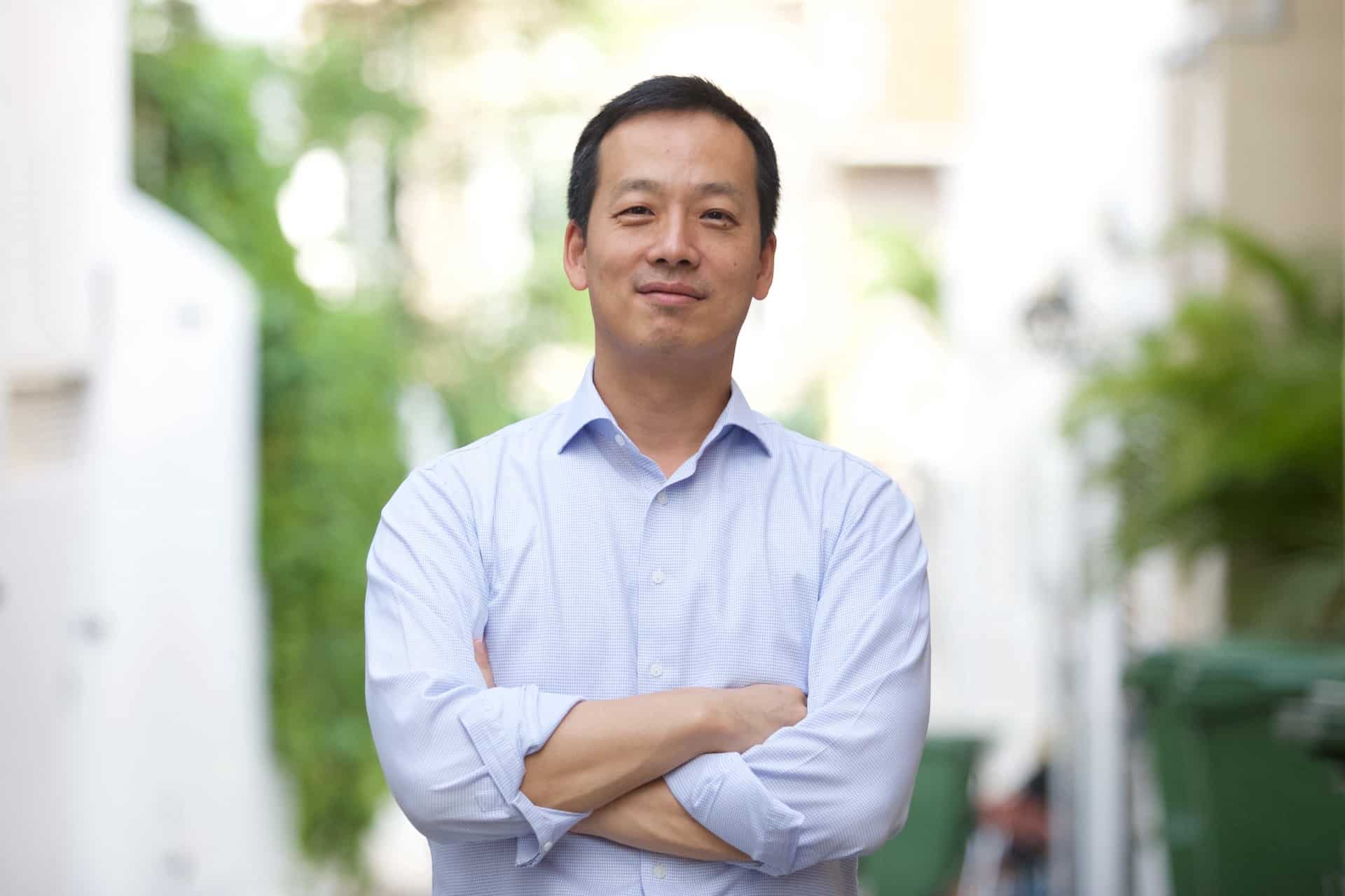“There is no exit option from God!”: Faith drove HCA president Dr Tan Poh Kiang’s vision of hospice care
by Tan Huey Ying // June 25, 2019, 8:41 pm
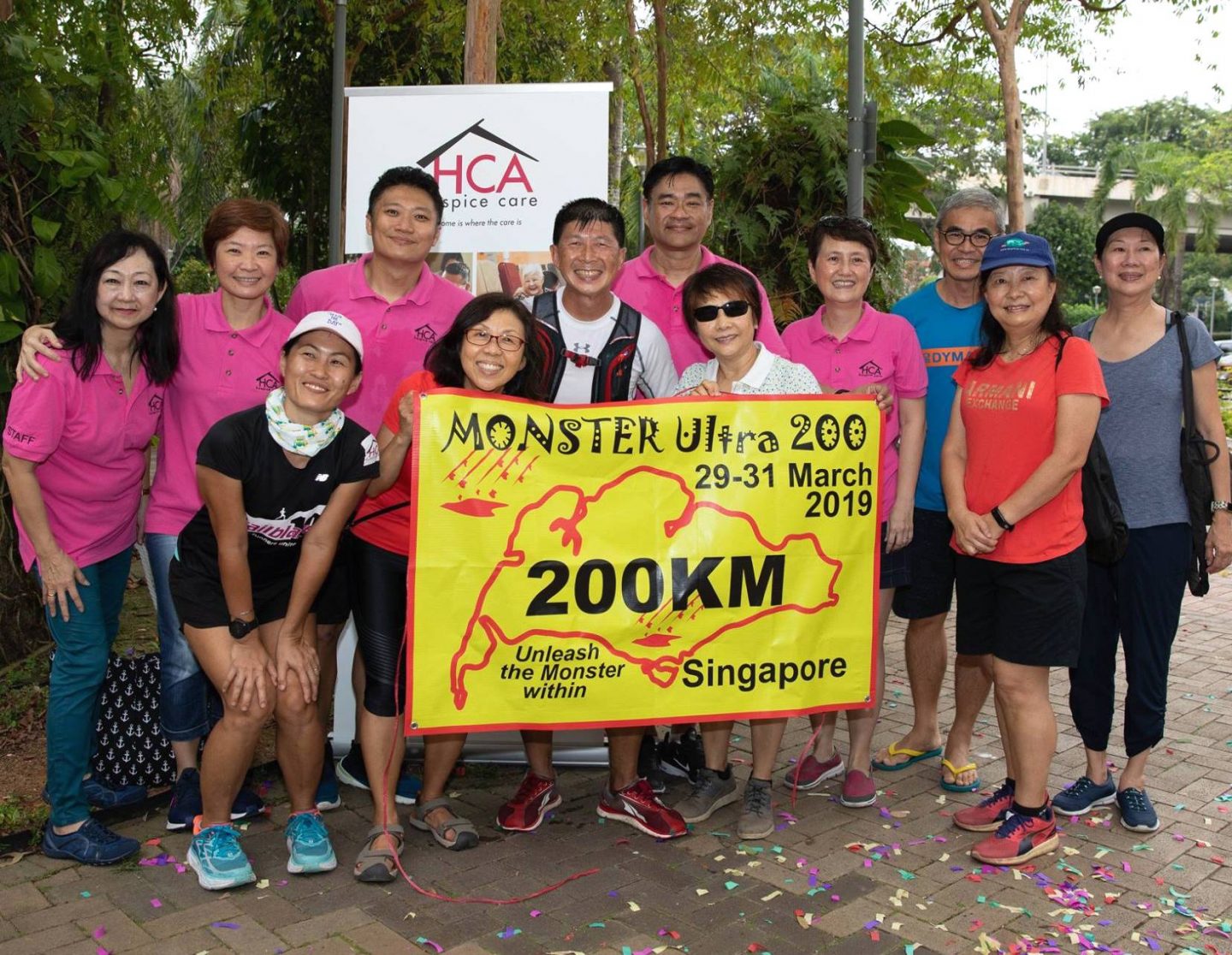
Dr Tan Poh Kiang (middle in white) with HCA staff who were at MacRitchie reservoir to celebrate his feat of running 200km in 45 hours on 31 March 2019, to raise funds for HCA. All photos courtesy of HCA Hospice Care.
Just say only.
In many organisations, office gossip of the empty promises and mere lip-service made by leaders and bosses are run-of-the-mill.
This C-suite leader, however, stands out from the crowd – both literally and figuratively-speaking.
In March this year, Dr Tan Poh Kiang, president of HCA Hospice Care, ran 200km in 45 hours – a distance just 10km shy of five back-to-back marathons.
“My ‘okay’ to God became an ‘okay’ to everyone.”
Three years ago, in 2016, he ran 100 miles (160km) and in 2014, he ran 100km.
His goal: To raise funds for his charity.
His point: Fund-raising is everyone’s responsibility – not just that of the fundraising committee. And his way of making the point?
Leading by example.
“I cannot just use clever words. I have to show it, right?” asks Dr Tan, who took over the presidency from ex-Minister Dr Seet Ai Mee in 2014.
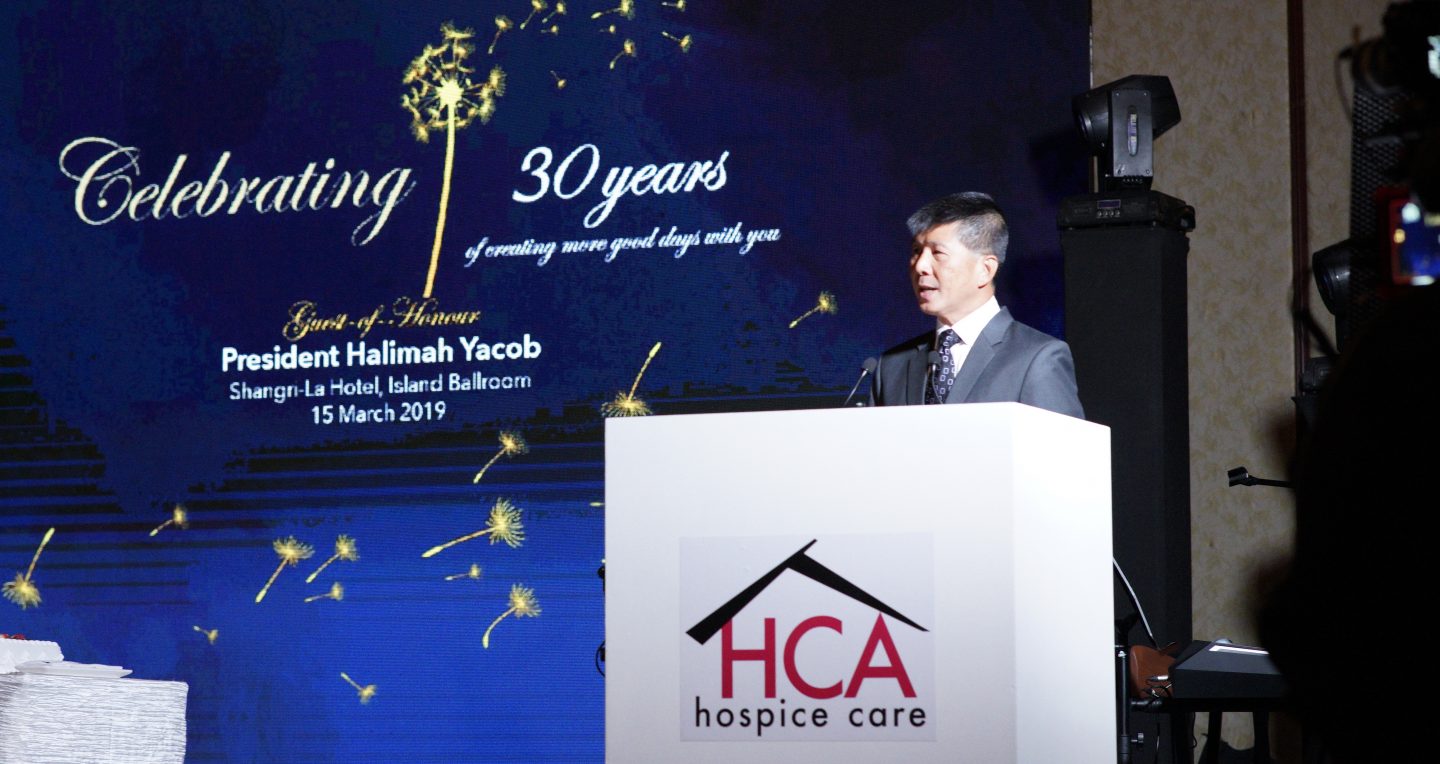
Dr Tan Poh Kiang giving a speech at HCA’s 30th Anniversary Dinner celebration.
The combined worth of this man’s efforts amounted to more than half a million in donations to HCA Hospice Care.
Wooed into service
After serving as a battalion commander in the army for over 12 years, Dr Tan was a family physician in Tiong Bahru when he was invited to lunch with HCA’s then-president Dr Seet Ai Mee.
The pretext for the meeting: Dr Tan’s advice was sought regarding the partnership between GPs and HCA in end-life care.
By the end of lunch, however, he realised what the meeting was really about. The HCA board of directors was looking for new blood to join them and Dr Tan’s name had come up.
But he was reluctant, and gave them a classic, non-committal response: “I said, ‘Let me pray about it.’
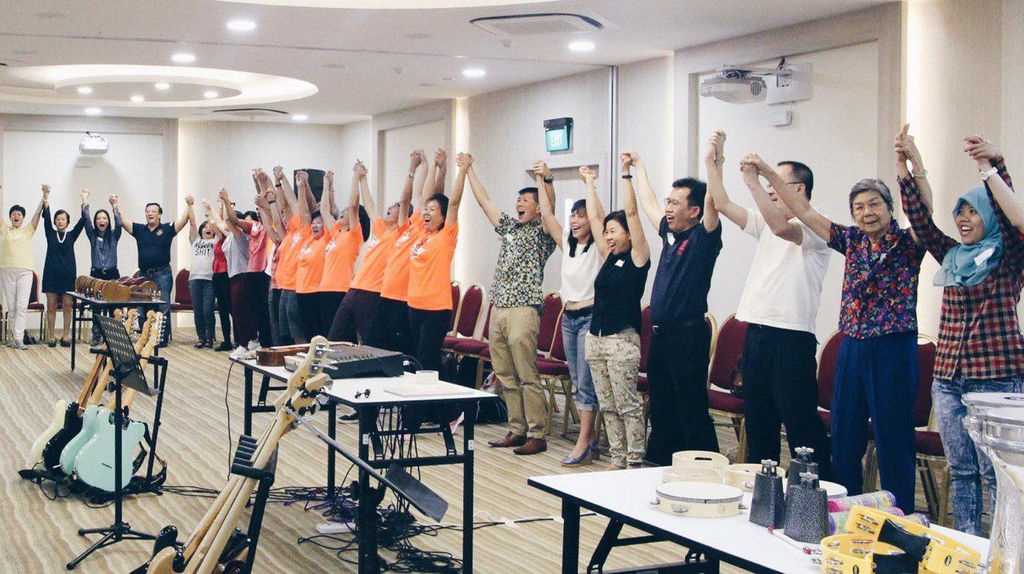
Dr Tan Poh Kiang (middle, in green shirt) at a recent HCA gathering with staff.
“Truth be told, we say only right? I was so busy, I forgot! It was not even on my mind.”
His children were young and he was serving in various capacities in church on top of holding regular clinic hours.
“Nearly every day of that year, I wished that I could quit. But I knew I had no exit option from God.”
Another call came one year later in March 2013.
“Cham liao,” Dr Tan chuckles. “I knew they were coming back for an answer. So, I prayed.”
He was not ready for the clarity he received: “I can only describe it as ‘divine’ – because I didn’t understand it.”
In obedience, he told God and Dr Seet: “Okay.”
His invitation was to join the board, but barely two months later, Dr Tan had a nagging feeling. He confronted Dr Seet: “I said, ‘Dr Seet, very funny. Your council people talk to me as if I’m the next president.’ She kept quiet!
“ ‘You are,’ she then replied.”
He was shocked – this was not what he had signed up for.
“Like that also can? No one formally asked me if I was ready to lead!
“I felt like I had just dropped into an abyss. My ‘okay’ to God became an ‘okay’ to everyone.”
Ten months later, Dr Tan’s appointment was made public.
He took over the reins of HCA in August 2014, a mere 15 months after he had joined the organisation.
“What does a president do?”
Dr Tan compares his early days in HCA to boot camp. “It was very, very tough. I asked whoever cared to listen, ‘What does a president do?’ ”
He envisioned the fairness of an organisation where “we catch people doing right, not only doing wrong”.
In his first year as president, Dr Tan attended 55 meetings – a number almost unheard-of amongst chairpersons. (In HCA, the president of the council is the equivalent of the chairman of a board of directors.)
“No point counting,” Dr Tan eventually decided at the end of his first year – it had cost him precious time and attention from his family, ministry and even his practice.
“But it was an authentic calling. I didn’t want to give God anything less than the best,” he explains.
In the midst of it, an internal crisis arose. In August 2015, Dr Tan was forced to retrench staff.
“Nearly every day of that year, I wished that I could quit. But I knew I had no exit option from God. He had put me there. And based on His character, He would not forsake me.” (Deuteronomy 31:6)
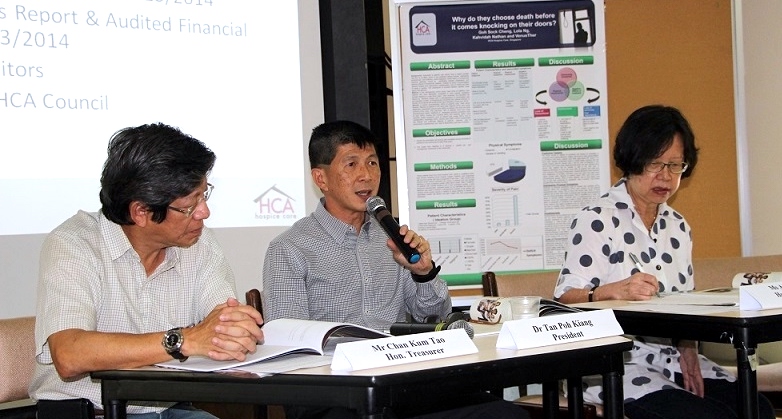
Dr Tan attended over 55 meetings in his first year as president of HCA Hospice Care.
He cried out to those in his circle of care, namely his wife, Joan, and his cell group, which he has led since 1993.
But he also reached out to members of his council. “I told them I didn’t know how to handle this, and if they let me make all the decisions, the organisation was going to drown.”
The council rallied together and Dr Tan gives credit to the style of collective leadership that governs HCA.
New DNA
Out of that crisis, Dr Tan also realised: Even though on the surface, HCA was doing good work, the DNA of the organisation needed to be rejuvenated and governance standards needed to be raised.
“We couldn’t do this in a haphazard way, or just use lip service,” Dr Tan says.
“I choose not to be that kind of president where I answer to no one.”
Transparency and accountability were high on his agenda – and it began with an attitude of humility and openness towards feedback and challenges from his own board members.
On important matters, Dr Tan seeks buy-in from his council before he proceeds. “They actually killed some of my ideas,” he says wryly.
“But the leadership grew closer because they could see that it wasn’t just about my ego.
“We do things not just to make me feel or look good. It is about the cause, and I need to decrease, where somebody else – or the organisation – needs to increase.
“I always tell people, ‘Actually, president no power,’ ” Dr Tan says. “Because I choose not to be that kind of president where I answer to no one.”
It is a belief rooted in the recognition of his identity as a servant of Christ.
Eventually, two committees were formed.
A Governance Committee provided oversight for the board while the Audit Risk Management Committee conducted organisation-wide audits led by one of the big four firms in Singapore.
HCA also applied for and achieved the status of Institute of Public Character (IPC), a title that recognises good governance within charities in Singapore through the rigour of standards set.
Rebuilding culture from the ground up
Dr Tan also revamped the appraisal system as he sought to change the organisational culture.
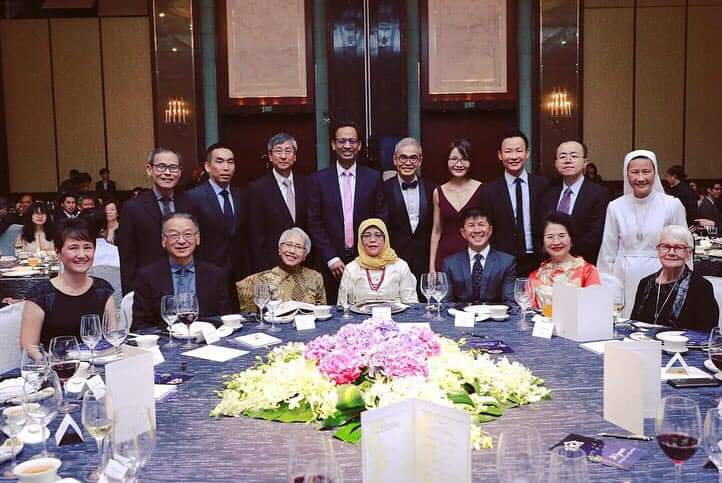
Dr Tan (first row, third from right) seated next to President Halimah Yacob at HCA’s 30th Anniversary Dinner.
“The compelling push factor at the time was that we had to discard a system where people knew how to ‘game’ it,” Dr Tan says. “We all very clever – know how to go to a big meeting, write the right messages and say, ‘People are our assets.’ Like real lor!”
“The leadership grew closer because they could see that it wasn’t just about my ego.”
He envisioned the fairness of an organisation where “even the introverted, quiet people who do their own work but do it well, are rewarded”, where “we catch people doing right, not only doing wrong”.
Dr Tan believes that even the smallest, most unremarkable actions deserve to be highlighted and recognised in the presence of community.
“Culture building goes through many cycles and iterations, you have to be consistent and walk your talk.
“We cannot say one thing and do something else.”
Once staff start doing it regularly, it becomes an organisational habit. And culture is built on the cumulation of many organisational habits.
Respect that breeds openness
But Dr Tan is convinced that, as leaders, sometimes doing the right thing is not enough. In fact, it is more important to communicate the motivations behind the programmes to get buy-in and to get feedback and ideas from ground-level staff who are doing the actual work.
“We cannot say one thing and do something else … company culture is built on the cumulation of organisational habits.”
And the only way to do that is through “lavish and informal” communication.
For Dr Tan, that comes through the interpersonal relationships that come as he engages with people on the ground. Two Thursdays a month, he spends time with those who work the ground, such as the nurses, operations and support staff.
“Initially, it was awkward,” Dr Tan admits. “I’m not just board member, but president!” But over time, word spread about the heart-to-heart chats.
Dr Tan recounts several amusing instances where staff got so honest with him that they were not afraid to speak their minds. “After that, they will say, ‘Sorry, sorry, can you please don’t tell the CEO?’
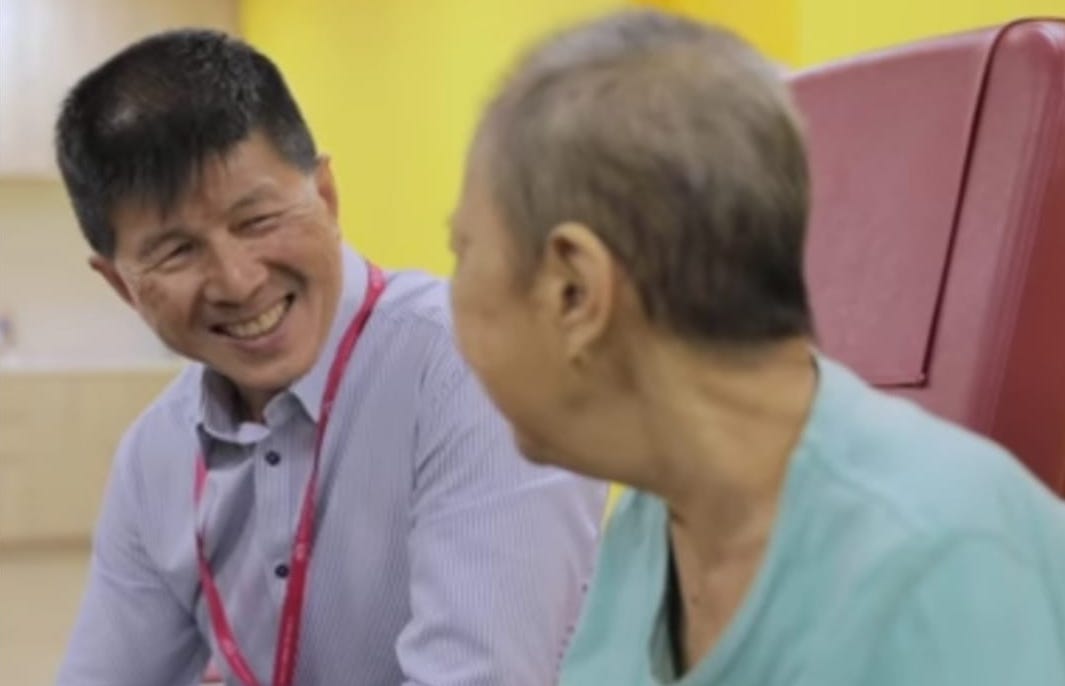
Dr Tan allocates two Thursdays a month to spend time with ground staff and clients on home visits.
“Huh? You don’t dare to tell the CEO? She reports to me leh!” he laughs.
“Then I’ll ask for ideas. So, in that sense, when we engage people on the frontlines and they are convinced, they’ll tell you how best your policy can be executed. If not, they will be coerced or resist you.”
Faith-driven leadership
In August this year, Dr Tan is handing over his role as president after five years of service. It has been a personal journey of growth in leadership, being humbled many times and learning from the wisdom of those around him.
“The culture now is such that people know they are welcome to speak – even if it is a contrarian view.”
Two Thursdays a month, he spends time with those who work the ground such as the nurses, operations and support staff.
It boils down to a level of respect for others, being willing to listen and not put down someone else’s view just because of education levels or rank.
By inviting different people to participate and incorporating various perspectives, there is diversity and a more robust way of converging on the shared HCA vision of helping people procure a good end to their lives.
At HCA, this translates to free hospice care for anyone who needs it – regardless of religion, socioeconomic status and even citizenship.
Given the secular nature of HCA, Dr Tan knows he cannot proselytise. “But I can certainly show by my behaviour, values and practice what makes me different as a Christ-follower.”
Living by the conviction that God’s standards rule over all, Dr Tan believes that the whole counsel of God must bear its presence in his life.
“Everything I do and say is faith-driven.”
Unapologetically, he says: “Everything I do and say is faith-driven. It’s just whether it is crafted in a language that we are familiar with.
“First and foremost, I am a child of God, a disciple and servant of Christ. From that flows my roles. If not, all the good that I do is worth nothing.
“I’m not using a secular organisation to promote one religion at the expense of others, it just so happens that this leader has a faith and he is expressing that faith in his service.”
Dr Tan’s fund-raising is still ongoing: Click here to find out more and to support Dr Tan’s efforts for this charity.
We are an independent, non-profit organisation that relies on the generosity of our readers, such as yourself, to continue serving the kingdom. Every dollar donated goes directly back into our editorial coverage.
Would you consider partnering with us in our kingdom work by supporting us financially, either as a one-off donation, or a recurring pledge?
Support Salt&Light
